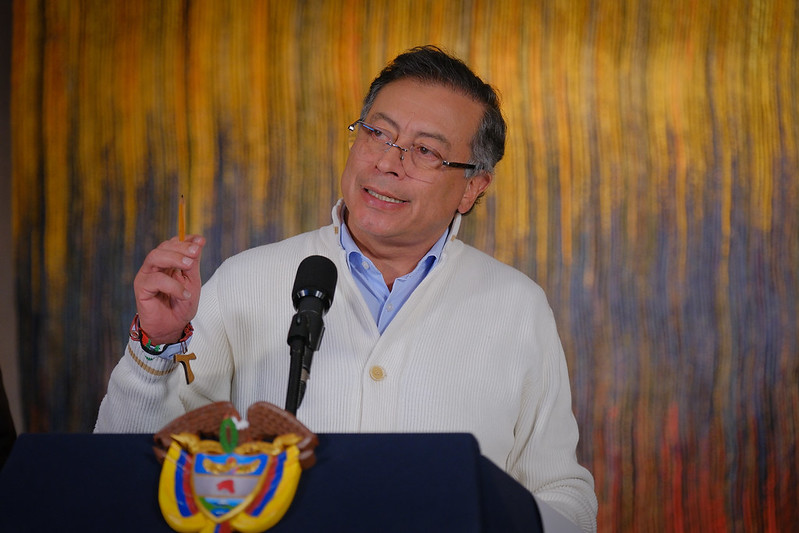Could President Petro completely ban coal exports to Israel? The warnings and losses Colombia would face

Although the Ministry of Commerce, Industry, and Tourism issued a decree banning coal exports to Israel in August of last year, companies have continued to ship certain quantities thanks to exemptions included in the measure.
This situation caused great anger to President Gustavo Petro, so much so that he accused his officials of "cheating" and ordered a complete ban on coal exports to the country.
"The president issued a decree prohibiting coal exports to Israel; it is being enforced. And the trap wasn't set by Drummond or Glencore (owner of Cerrejón), it was set by my Gatopardista officials," the president stated.
According to Drummond, these exports have been carried out in accordance with the authorization granted by the National Government. To this end, the company submitted the required documentation to a committee comprised of the Ministry of Commerce, Industry, and Tourism, the National Mining Agency, and the Dian (National Institute of Mining), as required by Decree 1047 of 2024.
Exports have continued because this prohibition does not apply to "legal transactions concluded before the Decree came into force, which generate a consolidated legal situation or a legitimate expectation."

President Gustavo Petro Photo: Ovidio González - Presidency of the Republic
For President Gustavo Petro, imposing this exception constitutes "complicity" because "62 percent of the coal that Israel uses to make the bombs that fall on Gaza comes from Colombia."
Therefore, he reiterated his instruction to "immediately remove" this exception and "no longer export coal to Israel." Otherwise, he ordered the Superintendency of Industry and Commerce to conduct the appropriate investigations.
But the Colombian Mining Association (ACM) contradicted these claims, stating that Colombian coal arriving in Israel has been used to generate electricity for homes, hospitals, and critical infrastructure around the world, including Israel and Gaza.
Colombian coal arriving in Israel has been used to generate electricity.
Furthermore, at the end of August last year, this union filed a complaint against this decree with the Council of State, which was accepted in December. This follows the one filed by Senator Miguel Uribe.
As part of this process, and following an invitation from the Council of State, Fenalcarbón presented a series of legal and constitutional factual elements that would be violated by this ban.

Photo: Drummond Ltd.
This proposed ban by President Gustavo Petro has sparked a legal debate in the country and generated conflicting opinions. For example, former minister and rector of the EIA University, José Manuel Restrepo, argues that the National Government has the authority to regulate and control foreign trade.
However, restrictive measures can only be established when justified for reasons of public order, international relations, national security, or the defense of the country's economic interests.
Therefore, President Gustavo Petro could issue regulatory decrees restricting exports to Israel if he provides adequate justification and bases his decisions on the existing legal framework.
However, former Minister of Foreign Trade Carlos Ronderos asserted that this ban would violate the principle of reciprocity to which Colombia committed itself in the World Trade Organization (WTO).
Additionally, because these are private exporting companies, he says the State cannot tell them who to sell coal to and who not to.

Drummond Ltd. coal exports. Photo: Drummond Ltd.
Fenalcarbón's CEO, Carlos Cante, also believes this ban is unviable because there are signed contracts and established legal situations.
Added to this is the fact that a Free Trade Agreement (FTA) has been in force between Colombia and Israel since 2020, which guarantees a series of safeguards for this type of contract , allowing companies to continue shipping coal to the country.
"It is an arbitrary and discriminatory measure against the coal industry, as it ignores national regulations on foreign trade and international treaties ratified by Colombia," the ACM added.
When an administrative authority attempts to directly influence commercial contracts, trust is lost.
Furthermore, Analdex president Javier Díaz warned that this situation could lead to a lawsuit against the Colombian government because these signed contracts exist and cannot be ignored.
There would also be reputational implications in terms of trade. "When an administrative authority attempts to directly influence commercial contracts, the trust of both buyers and suppliers is lost ," commented Carlos Cante.
But this loss of confidence isn't limited to coal exports; it ultimately affects all of Colombia's exports to the world, as reputational concerns begin to arise.

Photo: Drummond Ltd.
For the CEO of Fenalcarbón, the only loser with this decision is Colombia, because the volumes that were no longer exported to Israel have been replaced with coal from Indonesia and Australia.
Meanwhile, Colombia is losing foreign currency, taxes, and royalties, and is creating fewer jobs.
Since the implementation of the export ban to Israel in August of last year, Colombian coal sales to that country have decreased by more than 50 percent.
Before the measure, the monthly flow averaged 250,000 tons, but this figure has since fallen to 100,000 tons, highlighting a direct impact on the industry. Furthermore, no exports to this country were made during April and May 2025.
This restriction becomes even more significant considering that the impact is concentrated in the departments of La Guajira and Cesar, where coal accounts for 57 percent and 44 percent of their economy, respectively.
For every million tons Colombia fails to export, the Colombian government loses around 200 billion pesos in taxes and royalties, according to estimates for 2023.
eltiempo





%3Aformat(jpg)%3Aquality(99)%3Awatermark(f.elconfidencial.com%2Ffile%2Fbae%2Feea%2Ffde%2Fbaeeeafde1b3229287b0c008f7602058.png%2C0%2C275%2C1)%2Ff.elconfidencial.com%2Foriginal%2F907%2F3ed%2F599%2F9073ed599160f204dcad6b28116fdb16.jpg&w=3840&q=100)